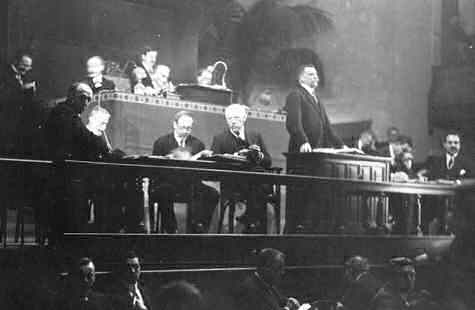Constitutional Assembly of Freedonia
The Freedonian Constitutional Assembly was created on 1919, after the declaration of indipendence of Freedonia from the Turtlish empire. It was formed by 327 deputies, elected by people with the universal suffrage.
Elections of the Deputies
On 23 March 1919 the people of Freedonia was called to elect 327 deputies of the Constitutional Assembly, in order to create the new fundamental chart of the nation. With a percentage of 98%, the parties which seated on the assembly were:
| Party: | Seats: | Percentage: |
| National Front party | 43 | 13% |
| Indipendentist party | 177 | 54% |
| Workers party | 108 | 33% |
| Total | 327 | 100% |
The Works of the Assembly
First meeting
The fist meeting of the assembly was on 29 March, on the Totans palace and on it the deputies decided to nominee Ivanhoe J. Tiserian (Indipendentist party) as President. On his first speak, he said:- "Dear Members of the Constitutional Assembly,
- with Freedonia on the heart I salute you. After century, our nation is free from the yoke of the died Turtlish Empire: our people had elected us in order to write our sacred Constitution, the first law of a new and great nation. We have different ideas, aims and hopes, but we are bounded by similar ideals: freedom, justice and liberty would be our guides in this difficult work. The dream of our fathers is now reality, it is on our hands to complete it.
- As singed by our soldier, I want to conclude saying:
- Hail, hail Freedonia! Land of the Brave and Free!"
Main Arguments
Different solutions were proposed on the different meetings of the Assembly, and on them the parties decided how manage the main aspects of the future Freedonian society.
Fundamental principles
Personal freedoms
Personal freedoms, after the strong limitation of the precedent occuping forces, were strong defended. Freedom of press, spoke and religion were accepted by the whole assembly, but a limitation of the free on communications was proposed by the National front party, in order to have a better control of subversives and criminals. It was refused by the other 2 parties, who seemed on it only a threat of a complete democracy.
Economic freedoms
Main differences were on the economy. The Workers party want to abolish private property and tax the revenues. The Indipendentist party, followed by National front party were against. The problem was solved only after 1 year, when the solution was the grant of the private property, but the main utilities were nationalized. Also a strong progressive taxation system and social aid to families and poor peoples were established.
Political freedoms
All parties are strongly decided to give political freedoms to the Freedonians, after century of vassalage under the Emperor. The people of Freedonia achieved freedom of reunion and freedom to make parties. Vote was made a right for all person with at least 18 years, and universal suffrage were introduced (also if it was already used for the elections of the Constitutional Assembly).
Structure of the State
Government
Government was made by a Council of Ministries, controlled indirectely by the Parliament, which can destitued it. The National front said that in this way the government would be too instable, but a threat of a possible authoritarian change stopped its proposal.
Parliament
Parliament was made the most important body on the Republic. Workers party proposed the creation of local parliaments, which were unified on a central parliament, called Uniska (freedonian sloveniac word for soviet). The other parties, with a more liberal view, decided to adopt a classical parliamentary solution, with regional election of the deputies with universal suffrage.
Juridical system
The Indipendentist party proposed the direct elections of judges by people, also with the substantion of the National front. The National Law Academy feared this solution; it known that a direct elections is usually a way to have a less indipendent juridical system, which will be based only of temporary ideas. Then the solution was the creation of a National Jugde Organ, which became the indipendent body of judges, with power over the nominees, promotions and dismissals of judges without any interference of others powers.
Capital and Flag
Capital
Without great problems, the capital was confirmed on Freeburg, the greatest city of the nation.
Flag
The flag proposed by the National front was a return of the old royal vessil, but the other parties were strongly againsts it, becuase it could be a symbol of xenophoby. Workers party proposed a F bounded with a sickle, but at last an italic F contourned with a laurel was the flag adopted.
Final draft
The final Constitution text was approved on 27 december 1920 with a votation of:
- For: 324
- Abstain: 2
- Against: 1

